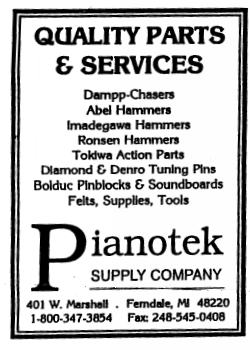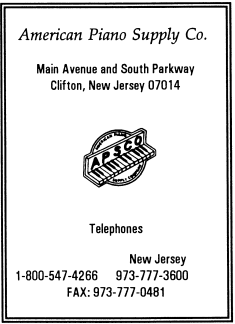Customer Selling Points
by Paul Eccardt, President
When a potential new customer calls you for a tuning and an
estimate for repairs, do you charge one price for both?
This can work against you; the customer will rarely turn down what might be
perceived as a "free" estimate, and after the work is done the piano owner
might conclude that it sounds good enough for now, putting off indefinitely
any work other than the just completed tuning.
If you charge extra for your
tuning over the price of the estimate, or charge less for the estimate
without tuning, you will keep the incentive alive for them to do
the job. If you apply all the money toward the price of the job
only if they agree on the spot, and half of the money if they do
the job on a later date, you will keep them with an incentive
and still get paid for your service call.
What do you do if the piano is in such bad shape that it is very
difficult
to tune unless you fix it first, but the customer says, "just tune it"?
If you try to make the customer happy and just tune it, you will not
only be putting yourself in a bad situation, but ultimately, the
customer
isn't going to be happy. Parts or strings could break and you will have
a
nightmare on your hands. You know the customer is going to hold you
to the original tuning price, and has no intention of doing the
job,
or they wouldn't have said, "just tune it". If you refuse to tune it, they
might
refuse to pay you, and so you must make sure you say in advance that there is a
charge,
even if the piano can't be tuned.
|
Telling customers things before hand can be good and sometimes bad.
If you tell the customer too many additional prices over the phone like the
price of double tuning, price of regulation, etc., it could scare them out of
having
you over. Good salespeople do not spoil their chance to get in the door. If
they
ask you how much it costs if the piano hasn't been tuned for a long
time,
keep it simple by saying something like, "It
might
cost somewhat extra if it hasn't been tuned for along time." If they
ask how much
extra, you could say that you need to see it first. Some tuners will
tell their
customers in advance that stings might break or the plate could crack,
and
that they are not responsible! Some even try to get them to sign a waiver
stating
it. That gets excessive; they might lose all their customers with
that
attitude. Some customers don't mind paying extra for strings that might
break, as long
as you tell them that it is very unlikely and how much it will cost them
if they do break.
Another way of handling strings breaking is by not say anything unless
it happens. If they do break,
you tell them that they have to pay for it because it isn't your fault,
and see how they react.
If they get too upset tell them that you will pay for it, and just fix
it. 95% of the time
they won't let you pay for it.
These were just a few ideas that you can
think about before
you talk to your customers. And you will build on these suggestions from your own good
and bad
experiences with your customers.
|

